
In this article, I’ll show you how to stay motivated to learn guitar. Here are all the tricks I learned over the years. Are you finding it hard to make consistent progress? Many people begin learning the basics and then slowly get discouraged.
If you’re like me, you probably started very excited and then realized it was going to take more time and effort than you thought. Maybe you attempted to play guitar in the past and lost interest but want to give it another try.
Perhaps you always wanted to play the guitar but heard it’s hard and are fearful of failure. It’s not as hard as you think. All you need to do is follow these simple steps, and success is just ahead!
Ten Reasons Why People Lose Motivation
Here are some of the most common reasons people lose motivation when learning to play the guitar. If you are just beginning, try to avoid these common pitfalls. If you have played a while, then identify and focus on the points that apply to you most.
Remember, no one is perfect, especially when just starting out.

- Not having confidence in yourself
- Fingertip discomfort during when first starting
- Setting unrealistic goals
- Not having a practice schedule and being disorganized
- Trying to advance too quickly
- Not knowing how or what to practice
- Developing poor playing habits
- Not seeking help from others
- Starting with a guitar that is too difficult to play
- Lack of dedication and quitting too soon
This list is not meant to discourage you or take the fun out of playing the guitar. I just wanted to give you a basic overview of the potential pitfalls.
For more info, see Fingertips Hurt Playing Guitar? – How To Stop The Pain!
Most people just want to learn the basics to have fun playing and singing the tunes they like, which is great. Even pros that make their living playing guitar set aside time to have fun playing and jamming with friends.
Keep on reading for some great tips!
Get A Decent Guitar
Don’t Make Things Harder Than They Have To Be

If you want to stay motivated and learn guitar don’t make things harder than they really need to be!
The first thing to do is make sure the guitar you have isn’t too difficult to learn to play on.
“Hand me down guitars” can be notoriously bad starter instruments. That guitar sitting in a cold, damp attic for years with the warped neck will not be a good learning experience.
When you are first beginning, the last thing you want to do is make playing an uncomfortable or painful experience, especially if you have not developed calluses on your fingertips. If the distance of the strings from the surface of the neck is too high or the strings are too thick, this can cause problems from the very start.
The guitar you already have might just need lighter gauge strings and to be “set up” properly to play better. This can usually be done in a few simple steps, especially if it is an electric guitar.
If you are taking guitar lessons, then ask your instructor to help you choose a guitar. You don’t have to spend a lot of money to get something decent.
Electric Versus Acoustic
Electric guitars are usually easier to play than acoustic guitars. Consider starting on an electric model, even if you ultimately want to play acoustic music. You don’t even need to plug the guitar into an amplifier if you’re not into electric music.
If you would like to begin playing on an acoustic guitar, think about getting a nylon string classical-style instrument. It can be used to play any type of acoustic music, and the strings are easier to press down than an acoustic guitar with steel strings.
For players with arthritis of the hands, guitar type and string gauge are important. For more info, see Playing Guitar With Arthritis: Overcoming Your Hand Problems.
Age And Hand Size Matter
If the guitar is for a child or an adult with small hands, it’s important to choose an instrument that can accommodate the situation. There are guitars for children that are scaled down from standard size to match particular age groups. Adults can try guitars with a narrow and thin neck shape to find a good fit.
Keep It Fun

One of the best ways to stay motivated is to keep the learning process enjoyable. Playing the guitar should be one of the things that add joy to your life, even at the beginning stages of learning.
Do It Your Way
Find a learning method that YOU enjoy and works well for you. You can always change it as you go but keep it fun. You never want guitar practice or playing to be drudgery!
If you’re like me, then you love music and want to play guitar to connect with it on a more personal level. When I first started playing many years ago, I was immediately drawn to the electric guitar and all the sounds it could make, which was way too cool to pass up!
I took a few guitar lessons and then decided that learning by myself would be more fun. My main approach was playing along with record albums, and copying guitar solos note for note. Eventually, I bought more guitar books and even took a few more lessons here and there.
Before I knew it, I was giving guitar lessons, something I never envisioned when I first started playing.
Cultivate Motivation
Listen to the music you like as much as possible, including music you want to learn on guitar. Don’t be intimidated by songs you like that require skills above your playing level. Use them for motivation and opportunities for improvement, instead.
Go to concerts and watch music videos whenever you can. When I was in high school, I would come home from a concert so excited that I would play my guitar for hours! I didn’t think that life could possibly get any better than that.

Make Good Times Even Better
Don’t be afraid to play your guitar to enhance any positive situation, event, or celebration.
Make time to play your guitar as a reward for something well done, like getting a good grade in a difficult class.
You don’t have to be a guitar virtuoso to play a few tunes and have others sing along at a party or get together.
The more you associate guitar playing with having a good time, the more motivated you will be to practice and take your playing to the next level.
Add A Little “Something Special”
Another thing you can do to keep things on the fun side is to add a little something that makes playing your guitar a little easier or more enjoyable. For example, you might buy a new kind of guitar pick that will help you play with it slipping out from between your fingers.
Perhaps getting a very cool-looking guitar strap will freshen things up a little. You can also add a strap lock system to take it to the next level. See Best Guitar Strap Lock System Review – The Top 10 Winners!
Add a reverb “stomp box” between your electric guitar and amp to make your playing sound more “dimensional.” For more info on stompboxes, check out What Is A Guitar Stomp Box – Attractive, Little, Tantalizing.
A guitar with a “snappy-looking” finish can add a little spice to your playing. For more info, see Cool Guitar Finishes – Is The Wow-Factor Your Main Criteria?
Don’t forget to plug your guitar into a great little amp. For more info, see Orange Micro Terror Review – This Amp Will Rock Your World!
You don’t have to spend a lot of money to spice things up and re-spark your interest.
Don’t Overdo A Good Thing
As a word of caution, don’t go overboard with adding accessaries because you could end up using the majority of your practice time on technical endeavors like turning knobs trying to improve the quality of your sound instead of the level of your playing ability.
I made this mistake during my beginning guitar playing years. I spent a lot of time, effort, and money on equipment to try to duplicate the exact sound of my favorite guitar players instead of concentrating more on learning how to play their material. You have to find a “happy medium” between the two approaches.
Have Your Guitar “At The Ready”
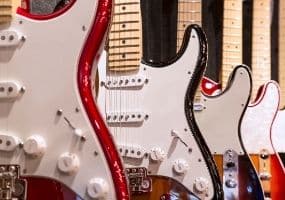
When you find the guitar that works for you, keep it “at the ready.” Out of sight is often out of mind. Don’t put it in the closet or under your bed. Keep it in plain sight and ideally in the room that you occupy most. I find that putting it on a guitar stand works better than keeping it in the case.
You are more likely to keep playing it throughout the day if it is staring you in the face. I keep my guitars everywhere. It’s great to be watching TV and just reach over to grab one without even getting up off the couch.
It’s ok to have a combination of organized and disorganized (off-the-cuff) practice time. It all adds up at the end of the day and helps keep the overall experience positive!
If you are living in a high-crime area or are concerned about the safety of your guitar, then consider taking steps to safeguard it. For more info, see How To Protect Your Guitar From Theft – Best Tips And Tricks.
Don’t Skip The Basics

Unless this is your first day as a guitar player, it’s important to get an idea of where you’re at in terms of your overall skill development on the instrument. If you try to skip the basics, then you may be creating your own disadvantage. These people typically play a while, get discouraged, and quit practicing routinely or altogether.
It’s easy to can get a general idea of your strengths and weaknesses on the guitar. Here are the basic skill categories you should focus on.
Melody
Melody usually involves single-note playing, or small groups of notes played at once. It is what electric guitar players commonly refer to as playing “lead guitar,” during which their job is to construct guitar solos.
It can be tempting to gloss over learning how to play guitar chords and concentrate mostly on soloing, especially if you play electric guitar. I did this for years when I first started playing, spending hours learning my favorite riffs off record albums.
Always try to practice an equal mix of melody and harmony so that one skill doesn’t overpower the other. If you practice from a good “guitar method” book or online program, this is automatically arranged for you.
For more info, see Learning Guitar Solos And Easy Ways To Remember Them!
Harmony
Harmony is essentially the “chordal” structure of a song. It is what is also called playing “rhythm guitar.” Most people learn just the basic guitar chords in the first 3 or four frets, which is a great start and could very well be all you need, depending on the type of music you want to play.
Back in my high school days, it was “power chords” (1st and 5th notes played together) or nothing! Playing a full major or minor chord did not sound “hard-core rock” enough, especially when using overdrive or distortion.
Certain musical genres, like jazz, require more complex chord voicings to be played all over the neck. Always be sure you have mastered the basic chords before talking the more difficult ones.
Now, I know literally thousands of chords that I learned over the years. It’s not a race, so take your time and have fun along the way!
Mixing harmony with the melody while playing a song, commonly called “chord melody,” is an advanced technique that requires mastery of both concepts individually.
Once you have a basic idea of your melodic and harmonic skill levels, you can create a practice regimen and set realistic goals. If you take online or in-person guitar lessons, then this will be done for you after an initial assessment.
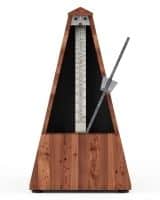
Timing And Tempo
Timing and tempo are fundamental to playing a song properly so that it sounds the way it was meant to be heard and puts you in synch with other musicians playing the song with you.
Timing is the amount of “pause” between one note and the next. Tempo is the “speed” at which the song is meant to be played. Learning to read music is one of the best ways to work on your timing and tempo.
If you play by ear, you can develop your timing and tempo by playing along with a prerecorded song or other musicians that have mastered this skill.
When you are practicing alone, always play using a metronome to develop your timing and help you lock in on the tempo.
Ear Training
Ear training is important because it makes it easier to play “by ear” (without reading music). If you don’t play by ear, ear training will help you understand things like the chord structure of a song as you play it from tablature or music manuscript paper.
Every time you listen to a piece of music, you are training your ear to a certain extent, even if you don’t play an instrument. When you sing your favorite song in the shower, you are relying on ear training to keep you from sounding “off-key.”
If you want to take a more structured approach to ear training, then start with a basic course that focuses on developing relative pitch with an introduction to the concept of perfect pitch. For more info on ear training, see Ear Training For The Guitar – Keeping It Simple For Success!
Developing a good musical ear can take years, and acquiring “perfect” pitch can take the better part of a lifetime, so don’t obsess with ear training, especially early on in your guitar studies.

Reading
Reading music is not a necessary skill, but it can make it a lot easier to learn new songs. Most guitar players these days rely on tablature or “Tab” to practice new material. It helps take a lot of the guesswork out of where to play each part of a song on the guitar neck (called “position playing.”)
You can always go “old school” and learn to read music on a staff, but this is not an absolute requirement, especially if it stresses you out. If you want to play professionally, then this skill can really come in handy.
There are many guitar apps and online tools that can help you improve your reading skills. Leaning to “sight read” a piece of music is an awesome skill to develop, but it is usually not a good idea to make it a high priority as a beginner. If you take on too much at once, it can seem overwhelming.
For more info, see Best Guitar TAB Sites – What No One Is Talking About!
Remember, always try to keep the learning process positive and fun whenever possible.
For more info, see Learn To Play A Guitar Fast – Best Tips And Tricks!

Set Realistic Goals
Most guitar players lose the motivation to practice because they set unrealistic goals. Everyone learns at a different speed, and each part of the learning process takes time. Trying to rush everything will only annoy you by making things more difficult than they really need to be.
You want to create a practice regimen that is both productive and enjoyable. Ideally, you should look forward to playing the guitar each day. If you are dreading it, then you are definitely doing something wrong!
Set short-term and long-term goals. Short-term goals can be things you want to learn in a week or a month. A long-term goal can be something like where you want to be in a year. Don’t set these goals in stone. It’s ok to take extra time when you need it to fully understand or learn something but try to stay on track whenever possible.
Always stay positive and try not to get discouraged. If you’re having a bad practice session, then put the guitar down. If things are going well, then extend your playing time, if possible.
Create A Practice Regimen That Works For You
If you are learning on your own, focus on creating a program with realistic goals, which fits your skill level and does not skip essential steps.
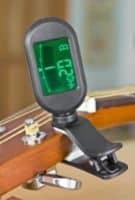
Tune Up
Always tune your guitar before playing it. If your guitar is out of tune, then nothing you play will sound right, and it will impede the development of your ear training. You can use a free online guitar tuner or buy one. I would suggest a “clip-on” tuner for use with both an electric or acoustic instrument if you purchase one.
For more information see How To Keep An Electric Guitar In Tune.
Start Slow And Build Up Speed
When you are just beginning, it is important to realize that it will take time to play notes and chords quickly. You need to build up calluses on your fingers and develop a whole new kind of hand coordination.
If you try to play quicker than you are capable, it will cause you to have finger and wrist discomfort, which is not productive or enjoyable.
Use A Metronome
Get in the habit of practicing with a metronome whenever possible to help you improve your rhythm and lock in on the tempo with a “laser focus.” There are free online metronomes that you can use or buy a small digital unit to keep in your guitar case.
A metronome is an indispensable tool if you are attempting to learn songs with very fast passages. Remember, being able to play fast without note clarity and accuracy is not a valuable skill.
Here’s a video by Tomas Michaud that will show you the basic way to use a metronome.
Create Your Ideal Song List
After you have learned the basics, like finger placement, create a shortlist of songs you want to learn. Learning material you like will definitely help keep you motivated. It’s important to choose songs that are at your approximate skill level.
If you want to tackle a song that is above your skill level, then concentrate on the easiest parts first. Don’t be afraid to “improvise” a complicated part like a guitar solo. You can always go back and learn it more accurately as you become a more capable player.
Mix It Up
Variety is the spice of life, especially in music. There’s no absolute need to play the same thing again and again until you want to puke. It’s true that “practice makes perfect,” but boredom and motivation do not play well together.
Don’t be afraid to mix it up if you feel yourself getting in a rut. Everything you play teaches you something, even if you don’t master it. There are so many things to play that it’s easy to switch gears. You can always return to a lesson at a later date.
Memorize When Necessary
You don’t have to memorize everything right away. You can always make note of a difficult concept and reference the information when necessary. Eventually, you will learn it by repetitive application.
There’s no shame in using tablature or sheet music to perform a piece of music. Symphonic orchestra players routinely read from sheet music when they perform, and they have advanced musical skill sets. If you can play it well without memorizing it, then you can consider it “mission accomplished.”

Record Yourself
Making an audio recording is a great way to judge your progress and identify areas in your playing that need work. Never be “too critical” about your performance, or it can de-motivate you. Use the recording process as an opportunity for improvement, not a “pass-fail”l scenario.
You don’t have to use elaborate equipment. The easiest way to do it is to record yourself on your smartphone. You can always save the audio files for comparison. It’s a fun and motivating experience to go back at a later date to hear how much you have improved.
Stay Confident And Tenacious
Confidence and tenacity will always get you where you want to go, eventually. It won’t really make a difference in the long run if your training is going slower than you would like or expect.
If your practice regimen is too aggressive or challenging, then don’t consider that a failure on your part; modify it to suit your needs as you go. Anything worthwhile takes time and effort.
Celebrate your achievements, no matter how small, and reward yourself whenever you complete a particular goal.
Remember, you are developing a musical skill that will bring you happiness and amusement for many years to come.
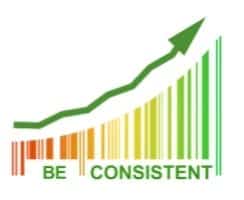
Be Organized And Consistent
The best way to learn to play the guitar or advance the skills you already have is to be organized and consistent with your practice regimen. If you just “noodle around” on the guitar every day, then you will make very little, if any, progress.
The more organized you are, the more focused your practice sessions will be. Consider creating a formal “practice plan” using your favorite scheduler software, a calendar, or a paper notebook. You don’t have to be “over-organized.”
Structure your content in whatever way works best for you. It should be built around the way you learn best, your practice time, and your skill level.
Choose a time period that is not excessive. Start with 10 or 15 minutes a day if you are a beginner and slowly increase it to 20 or 30 minutes. If you practice longer, then plan to take short breaks.
The last thing you want to do is “burn yourself out.” You can always break up your practice time into multiple sessions throughout the day.
It can be surprising how much you can accomplish in a short period of time if you don’t skip important steps and stay organized. Consistent improvement will motivate you to learn more and go further.
Adopt Good Playing Habits
Adopting good playing habits from the very beginning is a fundamental part of learning to play the guitar properly. Make a video of yourself playing the guitar, and the chances are that you will notice at least one bad habit that you were unaware of.
Here are some of the simple things you can do to help make it a positive experience.

Avoid Poor Playing Posture
Proper playing posture will help eliminate fatigue and optimize your hand’s wrist and finger mechanics to make you a more efficient guitarist. Find a playing posture that’s comfortable for you, which will be different when you play sitting versus standing. When you are first beginning, you will probably find it easier to play in a sitting position.
Consider using a footrest when sitting and find a chair that’s comfortable for you. If you play sitting on the couch, try to sit like you are playing in a chair.
When playing in a standing position, the width and length of your guitar strap can be important. Heavy guitars, like a Les Paul, require a may wider strap to avoid shoulder and back fatigue. Adjust the length of your strap so that the height of the guitar feels comfortable to play and helps avoid hand fatigue and carpal tunnel syndrome.

Try To Relax
Always get into the habit of being relaxed when you begin to play the guitar. It is counterproductive to practice if you are having a bad day or to continue to practice if your session is not going well.
You want your brain to associate playing the guitar with a positive experience. It shouldn’t be like a trip to the dentist to get a root canal, or a tooth pulled!
Here are some of the things that an anxious guitar player can experience. They are all bad habits, which may become more difficult to break down the road. Try to correct them as soon as possible.
Gripping The Guitar Neck Too Tightly
Putting a “death grip” on your guitar neck will make it difficult to move your fingers around the instrument properly and bend strings effectively. If you press too hard, you will also cause the fretted note to go sharp, and your guitar will sound out of tune.
Muscle Tightening
Muscle tightening is one of the most common causes of hand and finger muscle fatigue. It can eventually be the cause of medical problems such as carpal tunnel syndrome. If you feel your muscles tightening, then take a few moments to relax or try again later in the day.
Breath Holding
Guitarists tend to hold their breath when they are playing particularly challenging musical passages like guitar solos. Many times they may not even realize they are doing this. It can throw off your timing and make the music sound “choppy.” Sometimes it can even become obvious to people in the audience.
For more info, see How To Relax When Playing Guitar – 8 Best Tips And Tricks!

Play When You Feel Refreshed
Fatigue always makes everything more difficult and less enjoyable. Although this sounds obvious, it’s amazing how many people try to do their best work when they are tired, and playing the guitar is no exception.
It’s better to play for half the time when you feel refreshed than for twice as long when you are not at your best. You will accomplish more and have a better playing experience.
If you feel “worn out,” stressed, or physically uncomfortable, it’s important to stop playing. You can always begin another practice session later on or the next day.
For more info, see Learning Guitar For Seniors – Make Each Day Great With Music.
Create Your Own “Guitar Sanctum”

To get the most out of your practice sessions, create your own little “guitar sanctum.” It doesn’t have to be anything elaborate. Ideally, it should be a space that you enjoy and where you are isolated from distractions.
Find yourself a room with a comfortable chair and good lighting. This space should be readily accessible so that you can play at a fixed time every day and at a moment’s notice when musical inspiration strikes.
Keep all your guitars and other equipment like amps and a music stand in your sanctum. Decorate the wall with photos and posters of your favorite bands and guitar players that you admire to help spark your motivation.
If you have many guitars, you can disperse some of them throughout other areas of the house to prompt yourself to play whenever the opportunity arises. Don’t blame me if you encounter pushback from your family or significant other. I’m only telling you how I do it. ?
Choose The Best Time To Practice

Now that you have your guitar sanctum up and running, find the best time to have your practice sessions without distractions. It has to work for you and whatever else is going on in your life.
I personally find that early in the morning works best. I am practicing by 6 AM every day, playing for two hours during the week and longer on the weekends. This schedule has been going on for about 45 years and has yielded really great results. All the people that would disruptive my practice in-person or on the phone are still sleeping!
If you are not a morning person, then you may have to get more creative. Once you have the time and place figured out, you will be surprised at how quickly you can make progress on the guitar!
Don’t Be Afraid To Get Help
Even the people that learn really well on their own occasionally need help, so don’t be afraid to get it. If you become stuck or in a rut, you might require something or someone to get you back on track.
Maybe you learn best in a more structured environment, which can be a big organizational advantage if you know where to find the proper resources.
Here are some of the things you can do to get the help you need and motivate you to go farther.

Guitar Lessons
One of the best things you can do to learn how to play the guitar properly and quickly is to take guitar lessons. They can be done privately (one on one), in a group, in person, or online. There are so many possibilities that you can easily find the right one for you.
If you like learning online, you can Skype with an instructor, watch YouTube instructional videos, or use a web-based learning program like Yousician, Fender Play, and Truefire.
Collaborate With Other Musicians
Don’t forget about playing with other musicians, which is one of the most fun and motivating learning opportunities. There are distinctly different approaches you can take, and I would suggest trying them all.
Play With Guitar Players That Are Better Than You
When I first started playing guitar in junior high (middle) school, I was lucky enough to play in a rhythm and blues band with musicians in the 25 to 35 age group. I’ll admit that I got the gig by bugging them until they couldn’t take it anymore, but it worked.
I could barely play compared to them, but I worked hard, and they all taught me a tremendous amount. Never pass up a challenging learning opportunity just because it takes you outside of your comfort zone
Teach People Who Are Not As Advanced As You
Teaching sounds counterproductive to advancing your own guitar skills, but you would be amazed at how much you can learn by showing someone something you already know. It might also allow you to pick up a little extra cash or give something back for all the things you learned from others.
Seeing other players benefit and advance from your input can give you a positive and motivating feeling that can be just the “spark” you need to take you to the next step in your learning journey.

Use Social Media to Meet Like-Minded Guitar Players
There are numerous guitar groups on Facebook, Twitter, and various other social platforms that can teach and motivate you to play better guitar. Use this resource wisely so that it does not dominate your practice time. This might be a good “on-the-run” learning opportunity while you’re waiting to be seen at your Doctor’s office, etc.
Join A Band
Joining a band can be a lot more than a learning experience. It is one of the best ways to bring musical fun into your life and form life-long relationships. Playing in a live environment can do wonders to develop your rhythm, timing, and musical creativity.
Some of the bands I have played in have provided me with tremendous motivation and musical inspiration. It’s something you have to experience for yourself to understand what I mean.

How To Stay Motivated To Learn Guitar – Final Thoughts
Motivation is one of the most important driving factors in the transformation of any dream into a reality. When learning to play the guitar, it’s important to find the right mix of effort and fun to keep you motivated and moving in the right direction toward your goals.
Begin by defining the basic musical goals that will allow you to create a plan for an organized and realistic practice regimen. Confidence and tenacity are two of the key components that will help ensure your success.
Create your own “guitar sanctum,” that will provide you with a distraction-free and relaxing environment to help you achieve your goals.
Be creative in your approach whenever possible, which can help keep you motivated by making practice sessions less routine and tedious.
Don’t set strict time limits on achievements and skills can, which can be counterproductive and lead to periods of anxiety or frustration. Everything takes its time to learn correctly, and everyone learns at their own rate, so be flexible whenever necessary.
Find a guitar that is easy to play, which can help prevent physical discomfort and keep you from getting discouraged during the learning process.
Try to avoid developing bad habits that can slow down your progress by making things unnecessarily difficult.
Seek help from others whenever the situation calls for it, even if you are someone who typically learns better on your own. Taking guitar lessons is one of the best ways to stay motivated and properly focused.
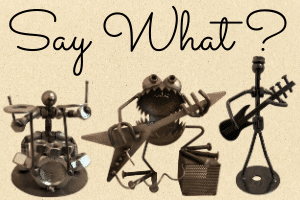
Tell Me What You Think
Please let me know what’s on your mind in the comment section, or if I can help you with anything.
- What are some of the things you do to stay motivated to learn guitar?
- Have you ever stopped playing guitar due to a lack of motivation or interest? What brought you back?
- How do you keep your practice time organized and focused?
- What’s been stopping you from progressing to the next skill level on the guitar?




Awesome article Frank. I can tell that you have been playing forever and are so confident that you inspire confidence in other guitarists. Like yourself I have been playing for over 40 years and love my music, it’s such a joyful time. Your advice about finding music that you love to play and not stressing when you are not practicing it right on the money. I always start my students with what they want to do so that it keeps them motivated to play (hopefully for their whole lives). Basics like using a metronome and tuning up first need to become second nature and you put those ideas forward in a gentle way. We are so fortunate now with all the available resources on the internet, it makes it so easy to find help.
Which online guitar course would you recommend?
Loved your article, thanks.
Hi Lily,
Thanks so much for your wonderful comments!
I could have been a lot more disciplined when I first learned to play guitar but I was having so much fun that I didn’t want to spoil that. As with anything, if you love what you do and stick with it eventually you find your way.
I really can’t remember a time when music wasn’t a part of my life. My mother played the ukelele and guitar, my father played the banjo, and there was always music playing on the radio and record player.
I have tried Yousician, Fender Play, and Truefire. I like them all. It really depends on which one suits your learning style best. Yousician is a great platform for working on your timing. There are so many good online learning resources but for anyone that has the money, I usually recommend one-on-one instruction with a good teacher, at least until you get the basics down and establish good playing habits.
Frank
I bet a lot of people start to learn the guitar and then give up. Being a pianist, learning an instrument is not a walk in the park, especially for an adult. As with anything, it takes dedication, hard work, an understanding of the long game, and above all, an inspired internal motivation to push through to success. Thanks for sharing.
Hi Molly,
Thank You for your comments!
There are many people who try to learn to play the guitar, because it is such a popular instrument, and then get discouraged. Anything worthwhile requires motivation and effort. You can never really master the creative possibilities of music, which is what has kept me playing all these years.
I hope the piano has brought you years of enjoyment and fulfillment and will continue to do so.
Keep on playing!
Frank